Parent Involvement: Importance, Perceptions, and Advantages
VerifiedAdded on 2023/03/17
|9
|2151
|61
AI Summary
This article discusses the importance of parent involvement in education, perceptions concerning parental participation and student achievement, and the advantages of parent's involvement. It explores the No Child Left Behind Act and its impact on parental participation, as well as the benefits of parent involvement for both students and parents. The article also highlights the positive effects of parent involvement on student achievement and social functioning.
Contribute Materials
Your contribution can guide someone’s learning journey. Share your
documents today.

Running Head: PARENTAL-PARTICIPATION
0
Parent involvement
Student Name
5/12/2019
0
Parent involvement
Student Name
5/12/2019
Secure Best Marks with AI Grader
Need help grading? Try our AI Grader for instant feedback on your assignments.
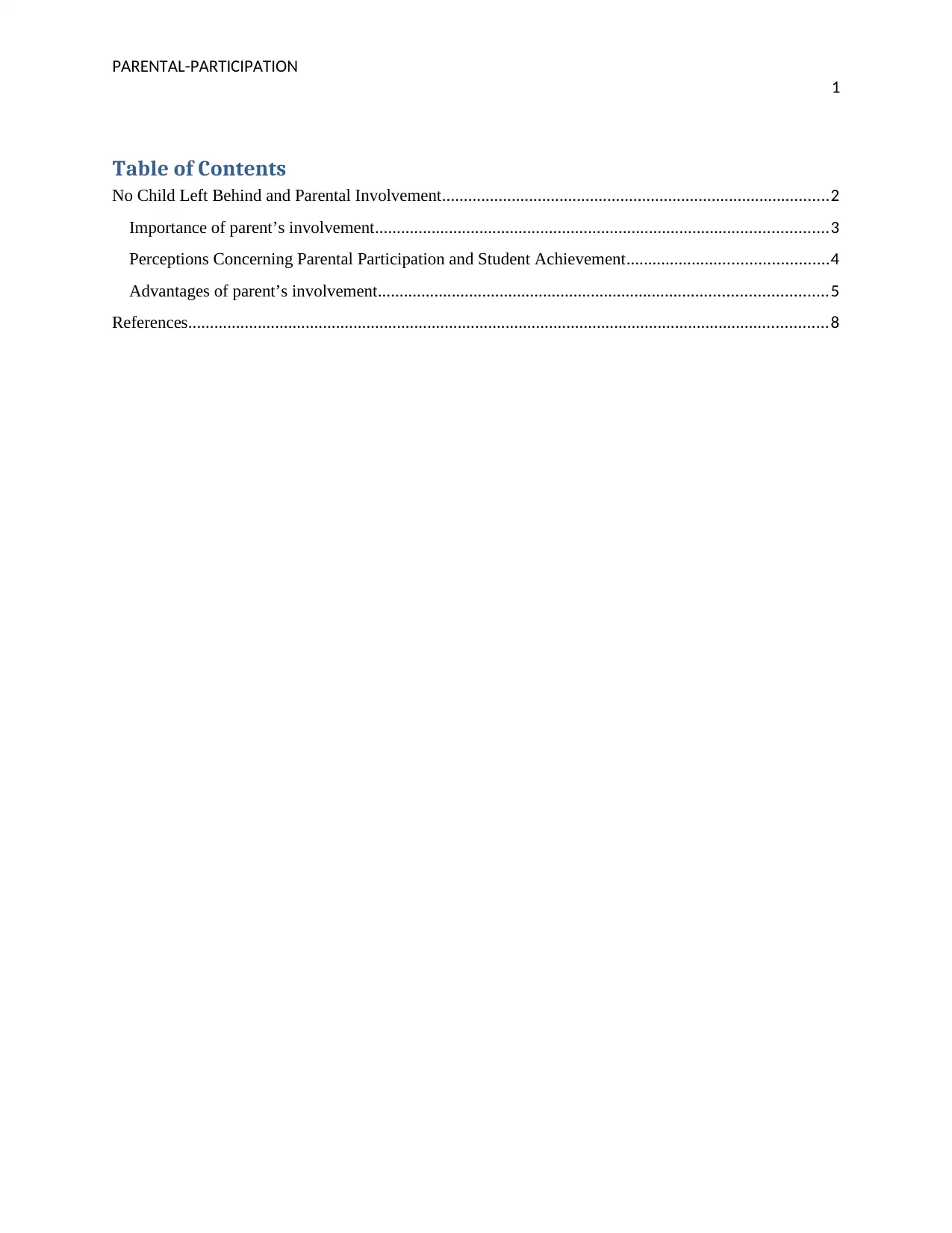
PARENTAL-PARTICIPATION
1
Table of Contents
No Child Left Behind and Parental Involvement.........................................................................................2
Importance of parent’s involvement........................................................................................................3
Perceptions Concerning Parental Participation and Student Achievement..............................................4
Advantages of parent’s involvement.......................................................................................................5
References...................................................................................................................................................8
1
Table of Contents
No Child Left Behind and Parental Involvement.........................................................................................2
Importance of parent’s involvement........................................................................................................3
Perceptions Concerning Parental Participation and Student Achievement..............................................4
Advantages of parent’s involvement.......................................................................................................5
References...................................................................................................................................................8

PARENTAL-PARTICIPATION
2
No Child Left Behind and Parental Involvement
No child left Act was implemented in 2001, which was then reauthorized the basic and
secondary learning act. This particular act changed the manner of education provided in schools.
It has delivered schools with the guidelines for removing the barriers of education that present
between the children belongs to low income and their more wealthy friends (McGuinn, 2016).
There are different areas contained by NCLB which concern to parental participation.
However, the numerous requirements can be engaged in some overarching groups: parental
announcement and choice, parental participation strategies, and responsibility (Vinovskis, 2015).
NCLB necessitates states to designate how they will gather and distribute effective parental
participation approaches to schools in their respective state policies to the U.S. Subdivision of
Education. The rule also needs school regions and institutes to have a printed parental
participation policy, which should be planned in association with and accepted by parents. The
guardians or parent must be involved in school backing teams envisioned to support schools,
chiefly low-performing institutes, in refining academic results. Low-performing institutes must
progress improvement strategies, which must comprise approaches to improve parental
participation (Park, & Holloway, 2017).
This Act provided some rights to parents;
They need to be informed about the progress of their children by receiving recurrent
progress reports. Parents have the right to have minimum one parent-teacher meeting every year,
reviewing classroom, and discussing with the staff about their child’s academic results McGuinn,
2016). To include parents in the institute they should be included in programs, events, and
courses designs and providing a written replica of the institute’s parent participation strategy,
2
No Child Left Behind and Parental Involvement
No child left Act was implemented in 2001, which was then reauthorized the basic and
secondary learning act. This particular act changed the manner of education provided in schools.
It has delivered schools with the guidelines for removing the barriers of education that present
between the children belongs to low income and their more wealthy friends (McGuinn, 2016).
There are different areas contained by NCLB which concern to parental participation.
However, the numerous requirements can be engaged in some overarching groups: parental
announcement and choice, parental participation strategies, and responsibility (Vinovskis, 2015).
NCLB necessitates states to designate how they will gather and distribute effective parental
participation approaches to schools in their respective state policies to the U.S. Subdivision of
Education. The rule also needs school regions and institutes to have a printed parental
participation policy, which should be planned in association with and accepted by parents. The
guardians or parent must be involved in school backing teams envisioned to support schools,
chiefly low-performing institutes, in refining academic results. Low-performing institutes must
progress improvement strategies, which must comprise approaches to improve parental
participation (Park, & Holloway, 2017).
This Act provided some rights to parents;
They need to be informed about the progress of their children by receiving recurrent
progress reports. Parents have the right to have minimum one parent-teacher meeting every year,
reviewing classroom, and discussing with the staff about their child’s academic results McGuinn,
2016). To include parents in the institute they should be included in programs, events, and
courses designs and providing a written replica of the institute’s parent participation strategy,
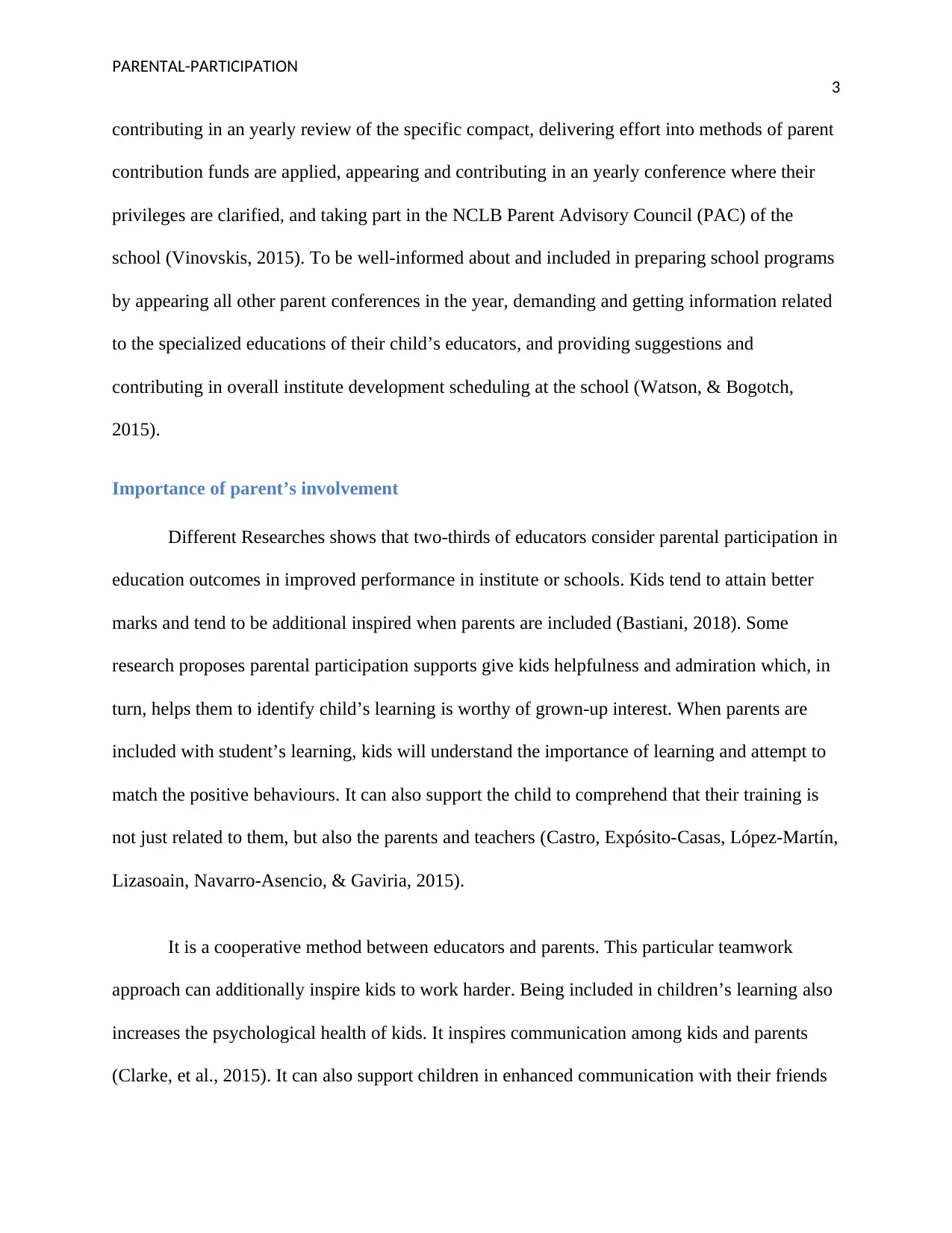
PARENTAL-PARTICIPATION
3
contributing in an yearly review of the specific compact, delivering effort into methods of parent
contribution funds are applied, appearing and contributing in an yearly conference where their
privileges are clarified, and taking part in the NCLB Parent Advisory Council (PAC) of the
school (Vinovskis, 2015). To be well-informed about and included in preparing school programs
by appearing all other parent conferences in the year, demanding and getting information related
to the specialized educations of their child’s educators, and providing suggestions and
contributing in overall institute development scheduling at the school (Watson, & Bogotch,
2015).
Importance of parent’s involvement
Different Researches shows that two-thirds of educators consider parental participation in
education outcomes in improved performance in institute or schools. Kids tend to attain better
marks and tend to be additional inspired when parents are included (Bastiani, 2018). Some
research proposes parental participation supports give kids helpfulness and admiration which, in
turn, helps them to identify child’s learning is worthy of grown-up interest. When parents are
included with student’s learning, kids will understand the importance of learning and attempt to
match the positive behaviours. It can also support the child to comprehend that their training is
not just related to them, but also the parents and teachers (Castro, Expósito-Casas, López-Martín,
Lizasoain, Navarro-Asencio, & Gaviria, 2015).
It is a cooperative method between educators and parents. This particular teamwork
approach can additionally inspire kids to work harder. Being included in children’s learning also
increases the psychological health of kids. It inspires communication among kids and parents
(Clarke, et al., 2015). It can also support children in enhanced communication with their friends
3
contributing in an yearly review of the specific compact, delivering effort into methods of parent
contribution funds are applied, appearing and contributing in an yearly conference where their
privileges are clarified, and taking part in the NCLB Parent Advisory Council (PAC) of the
school (Vinovskis, 2015). To be well-informed about and included in preparing school programs
by appearing all other parent conferences in the year, demanding and getting information related
to the specialized educations of their child’s educators, and providing suggestions and
contributing in overall institute development scheduling at the school (Watson, & Bogotch,
2015).
Importance of parent’s involvement
Different Researches shows that two-thirds of educators consider parental participation in
education outcomes in improved performance in institute or schools. Kids tend to attain better
marks and tend to be additional inspired when parents are included (Bastiani, 2018). Some
research proposes parental participation supports give kids helpfulness and admiration which, in
turn, helps them to identify child’s learning is worthy of grown-up interest. When parents are
included with student’s learning, kids will understand the importance of learning and attempt to
match the positive behaviours. It can also support the child to comprehend that their training is
not just related to them, but also the parents and teachers (Castro, Expósito-Casas, López-Martín,
Lizasoain, Navarro-Asencio, & Gaviria, 2015).
It is a cooperative method between educators and parents. This particular teamwork
approach can additionally inspire kids to work harder. Being included in children’s learning also
increases the psychological health of kids. It inspires communication among kids and parents
(Clarke, et al., 2015). It can also support children in enhanced communication with their friends
Secure Best Marks with AI Grader
Need help grading? Try our AI Grader for instant feedback on your assignments.
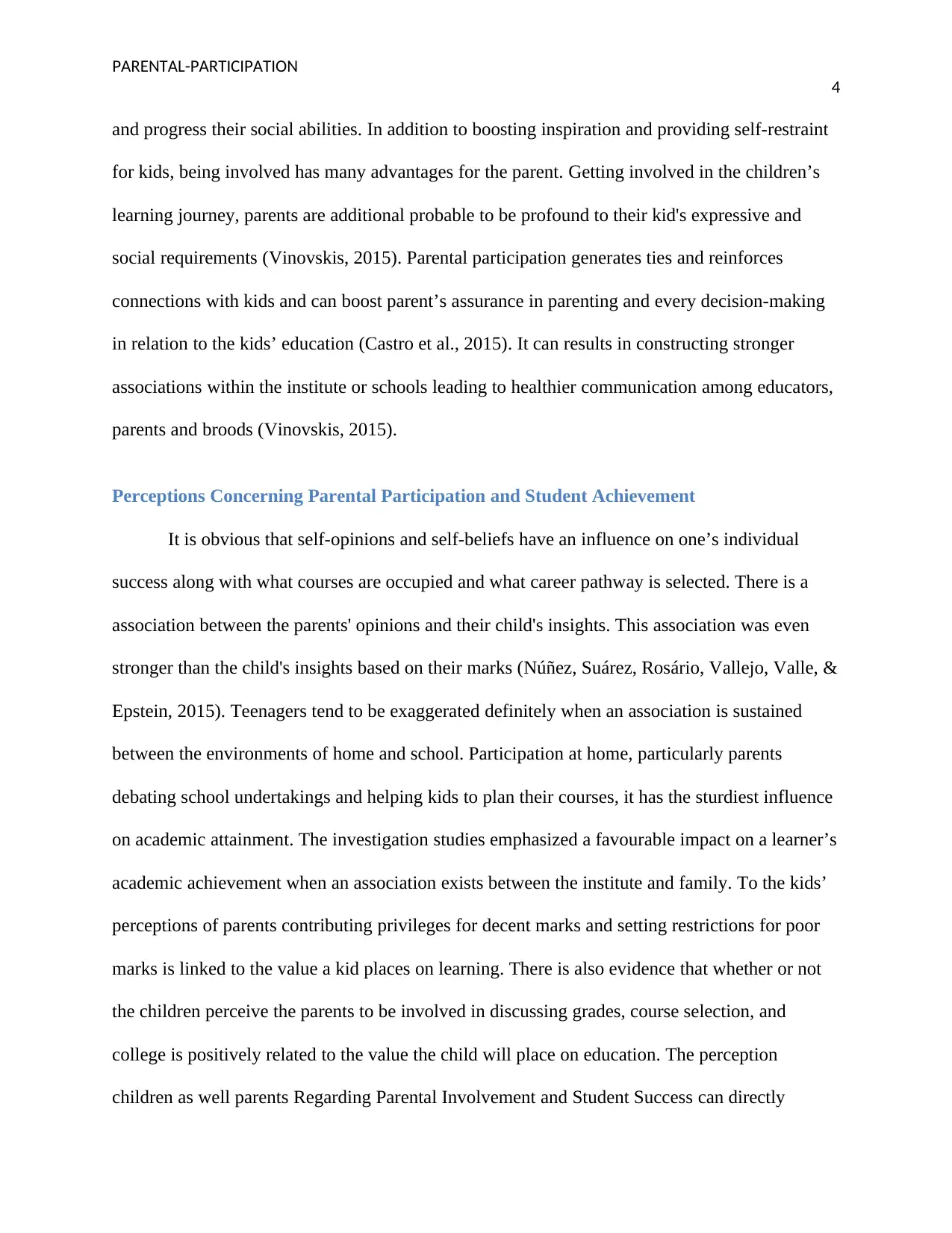
PARENTAL-PARTICIPATION
4
and progress their social abilities. In addition to boosting inspiration and providing self-restraint
for kids, being involved has many advantages for the parent. Getting involved in the children’s
learning journey, parents are additional probable to be profound to their kid's expressive and
social requirements (Vinovskis, 2015). Parental participation generates ties and reinforces
connections with kids and can boost parent’s assurance in parenting and every decision-making
in relation to the kids’ education (Castro et al., 2015). It can results in constructing stronger
associations within the institute or schools leading to healthier communication among educators,
parents and broods (Vinovskis, 2015).
Perceptions Concerning Parental Participation and Student Achievement
It is obvious that self-opinions and self-beliefs have an influence on one’s individual
success along with what courses are occupied and what career pathway is selected. There is a
association between the parents' opinions and their child's insights. This association was even
stronger than the child's insights based on their marks (Núñez, Suárez, Rosário, Vallejo, Valle, &
Epstein, 2015). Teenagers tend to be exaggerated definitely when an association is sustained
between the environments of home and school. Participation at home, particularly parents
debating school undertakings and helping kids to plan their courses, it has the sturdiest influence
on academic attainment. The investigation studies emphasized a favourable impact on a learner’s
academic achievement when an association exists between the institute and family. To the kids’
perceptions of parents contributing privileges for decent marks and setting restrictions for poor
marks is linked to the value a kid places on learning. There is also evidence that whether or not
the children perceive the parents to be involved in discussing grades, course selection, and
college is positively related to the value the child will place on education. The perception
children as well parents Regarding Parental Involvement and Student Success can directly
4
and progress their social abilities. In addition to boosting inspiration and providing self-restraint
for kids, being involved has many advantages for the parent. Getting involved in the children’s
learning journey, parents are additional probable to be profound to their kid's expressive and
social requirements (Vinovskis, 2015). Parental participation generates ties and reinforces
connections with kids and can boost parent’s assurance in parenting and every decision-making
in relation to the kids’ education (Castro et al., 2015). It can results in constructing stronger
associations within the institute or schools leading to healthier communication among educators,
parents and broods (Vinovskis, 2015).
Perceptions Concerning Parental Participation and Student Achievement
It is obvious that self-opinions and self-beliefs have an influence on one’s individual
success along with what courses are occupied and what career pathway is selected. There is a
association between the parents' opinions and their child's insights. This association was even
stronger than the child's insights based on their marks (Núñez, Suárez, Rosário, Vallejo, Valle, &
Epstein, 2015). Teenagers tend to be exaggerated definitely when an association is sustained
between the environments of home and school. Participation at home, particularly parents
debating school undertakings and helping kids to plan their courses, it has the sturdiest influence
on academic attainment. The investigation studies emphasized a favourable impact on a learner’s
academic achievement when an association exists between the institute and family. To the kids’
perceptions of parents contributing privileges for decent marks and setting restrictions for poor
marks is linked to the value a kid places on learning. There is also evidence that whether or not
the children perceive the parents to be involved in discussing grades, course selection, and
college is positively related to the value the child will place on education. The perception
children as well parents Regarding Parental Involvement and Student Success can directly
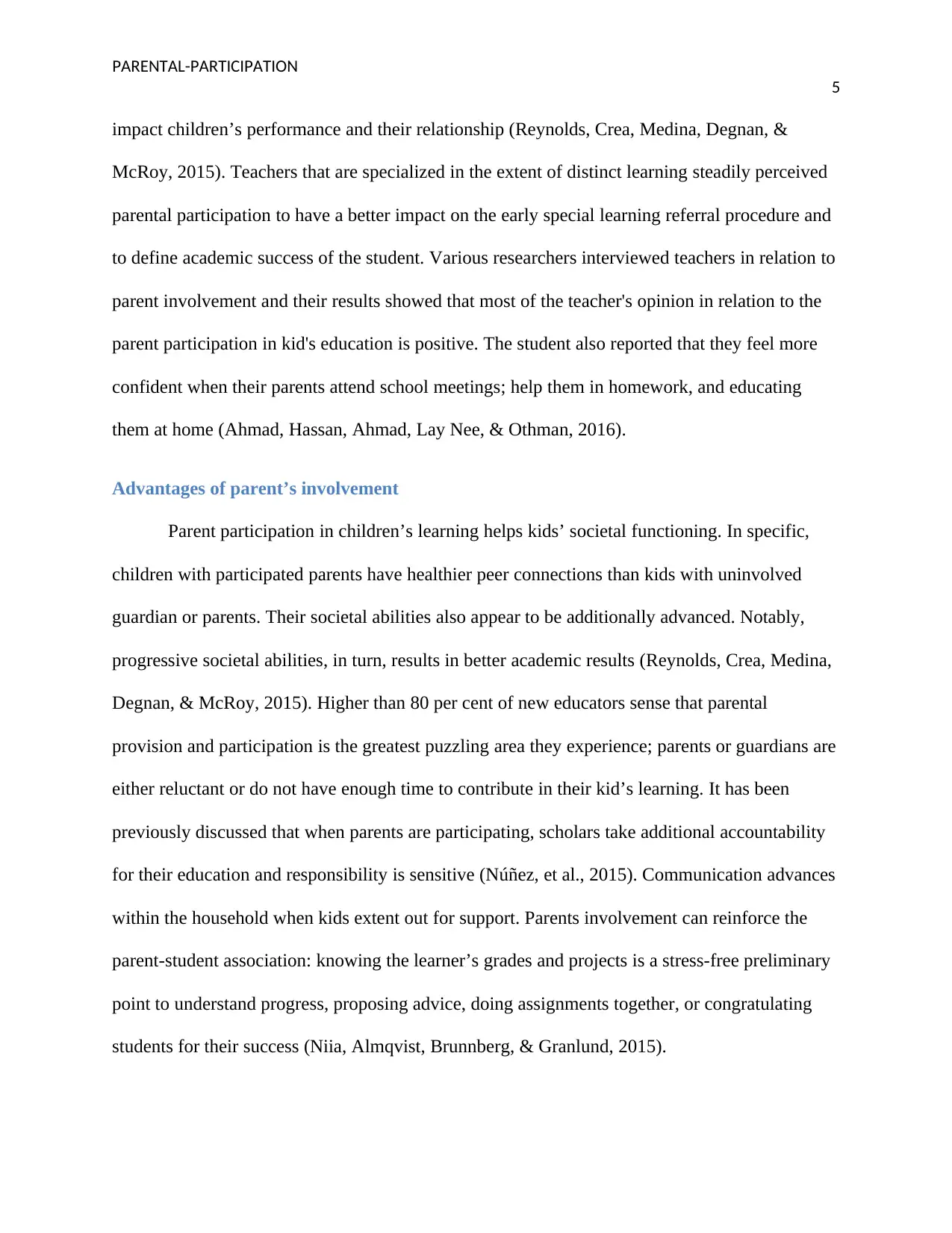
PARENTAL-PARTICIPATION
5
impact children’s performance and their relationship (Reynolds, Crea, Medina, Degnan, &
McRoy, 2015). Teachers that are specialized in the extent of distinct learning steadily perceived
parental participation to have a better impact on the early special learning referral procedure and
to define academic success of the student. Various researchers interviewed teachers in relation to
parent involvement and their results showed that most of the teacher's opinion in relation to the
parent participation in kid's education is positive. The student also reported that they feel more
confident when their parents attend school meetings; help them in homework, and educating
them at home (Ahmad, Hassan, Ahmad, Lay Nee, & Othman, 2016).
Advantages of parent’s involvement
Parent participation in children’s learning helps kids’ societal functioning. In specific,
children with participated parents have healthier peer connections than kids with uninvolved
guardian or parents. Their societal abilities also appear to be additionally advanced. Notably,
progressive societal abilities, in turn, results in better academic results (Reynolds, Crea, Medina,
Degnan, & McRoy, 2015). Higher than 80 per cent of new educators sense that parental
provision and participation is the greatest puzzling area they experience; parents or guardians are
either reluctant or do not have enough time to contribute in their kid’s learning. It has been
previously discussed that when parents are participating, scholars take additional accountability
for their education and responsibility is sensitive (Núñez, et al., 2015). Communication advances
within the household when kids extent out for support. Parents involvement can reinforce the
parent-student association: knowing the learner’s grades and projects is a stress-free preliminary
point to understand progress, proposing advice, doing assignments together, or congratulating
students for their success (Niia, Almqvist, Brunnberg, & Granlund, 2015).
5
impact children’s performance and their relationship (Reynolds, Crea, Medina, Degnan, &
McRoy, 2015). Teachers that are specialized in the extent of distinct learning steadily perceived
parental participation to have a better impact on the early special learning referral procedure and
to define academic success of the student. Various researchers interviewed teachers in relation to
parent involvement and their results showed that most of the teacher's opinion in relation to the
parent participation in kid's education is positive. The student also reported that they feel more
confident when their parents attend school meetings; help them in homework, and educating
them at home (Ahmad, Hassan, Ahmad, Lay Nee, & Othman, 2016).
Advantages of parent’s involvement
Parent participation in children’s learning helps kids’ societal functioning. In specific,
children with participated parents have healthier peer connections than kids with uninvolved
guardian or parents. Their societal abilities also appear to be additionally advanced. Notably,
progressive societal abilities, in turn, results in better academic results (Reynolds, Crea, Medina,
Degnan, & McRoy, 2015). Higher than 80 per cent of new educators sense that parental
provision and participation is the greatest puzzling area they experience; parents or guardians are
either reluctant or do not have enough time to contribute in their kid’s learning. It has been
previously discussed that when parents are participating, scholars take additional accountability
for their education and responsibility is sensitive (Núñez, et al., 2015). Communication advances
within the household when kids extent out for support. Parents involvement can reinforce the
parent-student association: knowing the learner’s grades and projects is a stress-free preliminary
point to understand progress, proposing advice, doing assignments together, or congratulating
students for their success (Niia, Almqvist, Brunnberg, & Granlund, 2015).
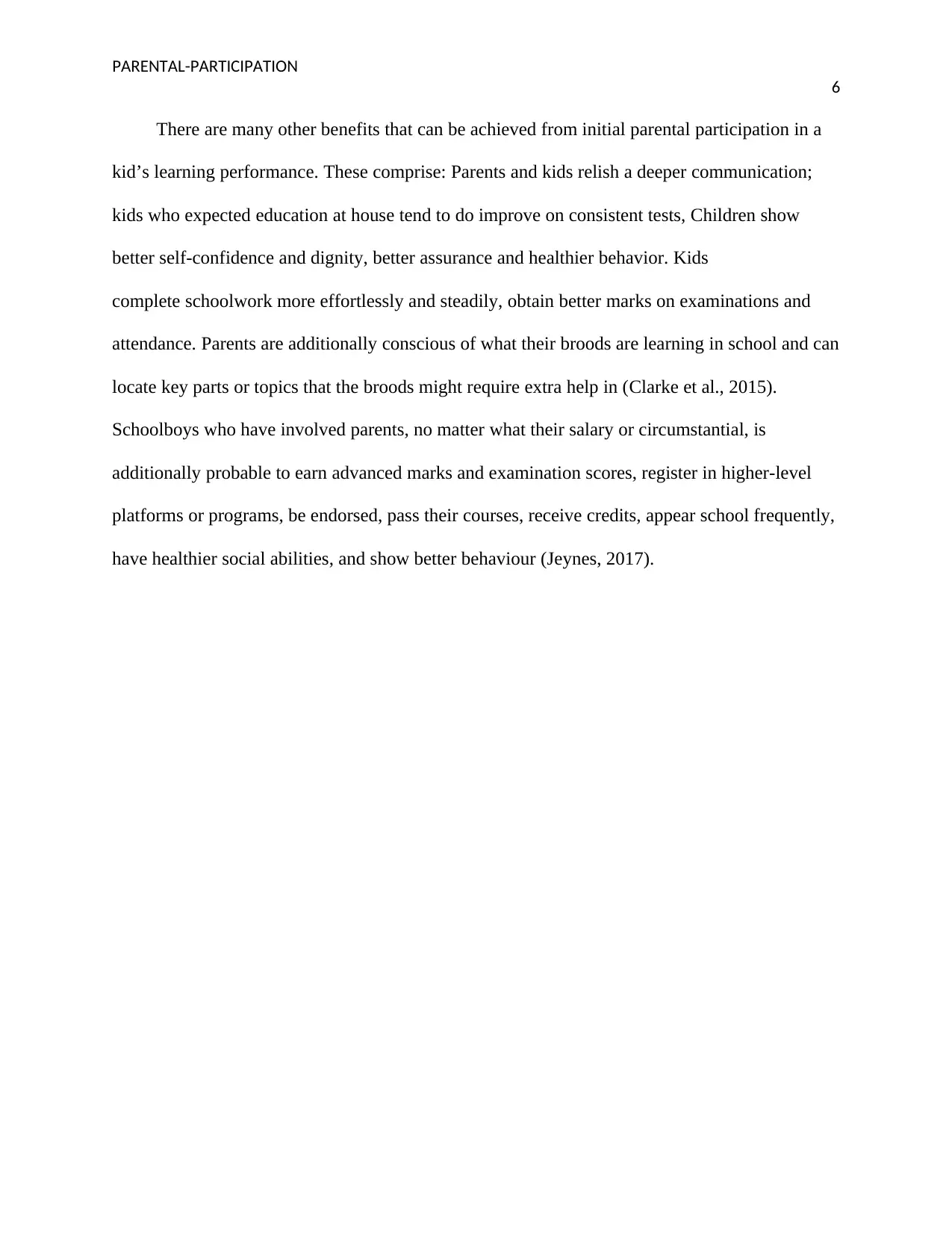
PARENTAL-PARTICIPATION
6
There are many other benefits that can be achieved from initial parental participation in a
kid’s learning performance. These comprise: Parents and kids relish a deeper communication;
kids who expected education at house tend to do improve on consistent tests, Children show
better self-confidence and dignity, better assurance and healthier behavior. Kids
complete schoolwork more effortlessly and steadily, obtain better marks on examinations and
attendance. Parents are additionally conscious of what their broods are learning in school and can
locate key parts or topics that the broods might require extra help in (Clarke et al., 2015).
Schoolboys who have involved parents, no matter what their salary or circumstantial, is
additionally probable to earn advanced marks and examination scores, register in higher-level
platforms or programs, be endorsed, pass their courses, receive credits, appear school frequently,
have healthier social abilities, and show better behaviour (Jeynes, 2017).
6
There are many other benefits that can be achieved from initial parental participation in a
kid’s learning performance. These comprise: Parents and kids relish a deeper communication;
kids who expected education at house tend to do improve on consistent tests, Children show
better self-confidence and dignity, better assurance and healthier behavior. Kids
complete schoolwork more effortlessly and steadily, obtain better marks on examinations and
attendance. Parents are additionally conscious of what their broods are learning in school and can
locate key parts or topics that the broods might require extra help in (Clarke et al., 2015).
Schoolboys who have involved parents, no matter what their salary or circumstantial, is
additionally probable to earn advanced marks and examination scores, register in higher-level
platforms or programs, be endorsed, pass their courses, receive credits, appear school frequently,
have healthier social abilities, and show better behaviour (Jeynes, 2017).
Paraphrase This Document
Need a fresh take? Get an instant paraphrase of this document with our AI Paraphraser
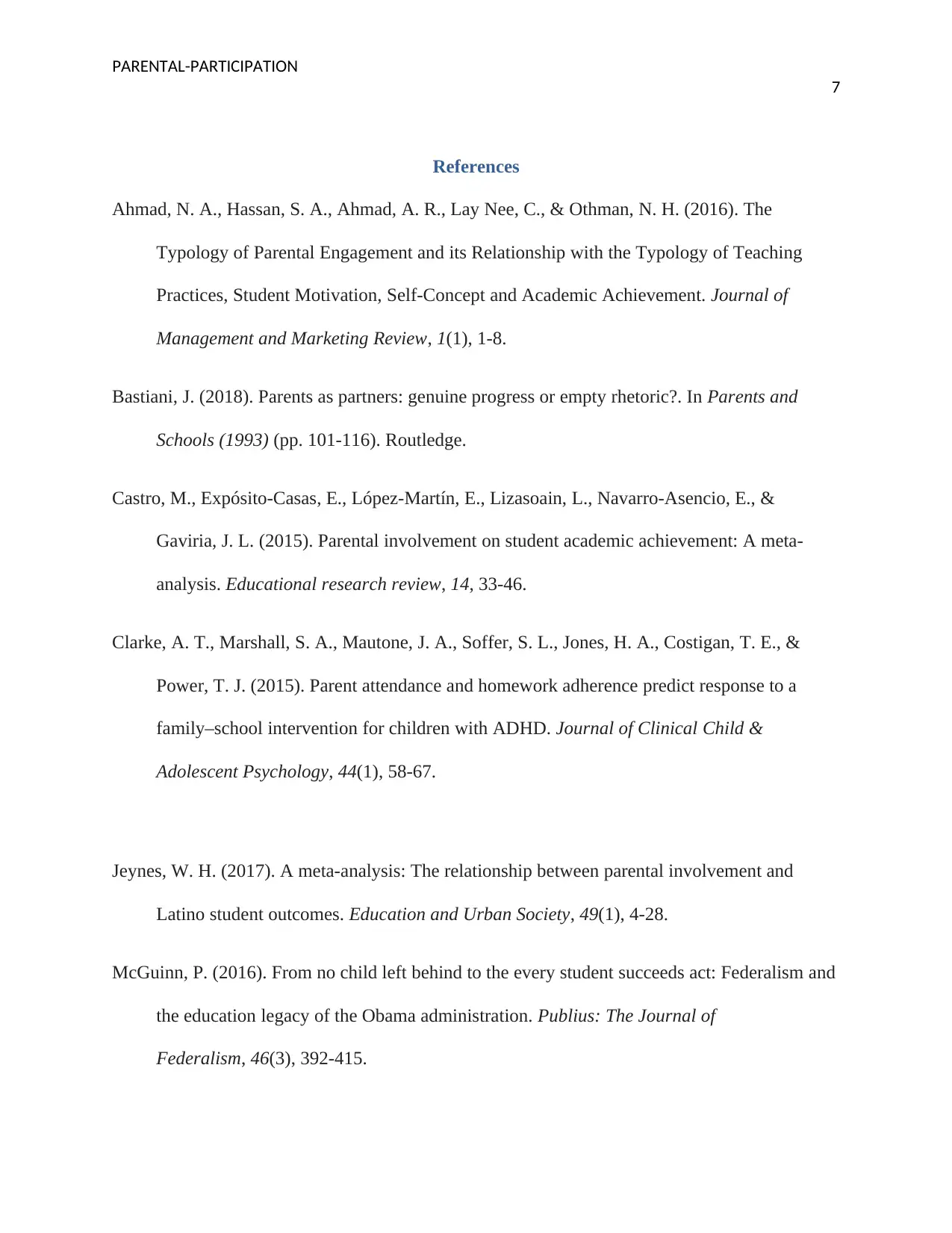
PARENTAL-PARTICIPATION
7
References
Ahmad, N. A., Hassan, S. A., Ahmad, A. R., Lay Nee, C., & Othman, N. H. (2016). The
Typology of Parental Engagement and its Relationship with the Typology of Teaching
Practices, Student Motivation, Self-Concept and Academic Achievement. Journal of
Management and Marketing Review, 1(1), 1-8.
Bastiani, J. (2018). Parents as partners: genuine progress or empty rhetoric?. In Parents and
Schools (1993) (pp. 101-116). Routledge.
Castro, M., Expósito-Casas, E., López-Martín, E., Lizasoain, L., Navarro-Asencio, E., &
Gaviria, J. L. (2015). Parental involvement on student academic achievement: A meta-
analysis. Educational research review, 14, 33-46.
Clarke, A. T., Marshall, S. A., Mautone, J. A., Soffer, S. L., Jones, H. A., Costigan, T. E., &
Power, T. J. (2015). Parent attendance and homework adherence predict response to a
family–school intervention for children with ADHD. Journal of Clinical Child &
Adolescent Psychology, 44(1), 58-67.
Jeynes, W. H. (2017). A meta-analysis: The relationship between parental involvement and
Latino student outcomes. Education and Urban Society, 49(1), 4-28.
McGuinn, P. (2016). From no child left behind to the every student succeeds act: Federalism and
the education legacy of the Obama administration. Publius: The Journal of
Federalism, 46(3), 392-415.
7
References
Ahmad, N. A., Hassan, S. A., Ahmad, A. R., Lay Nee, C., & Othman, N. H. (2016). The
Typology of Parental Engagement and its Relationship with the Typology of Teaching
Practices, Student Motivation, Self-Concept and Academic Achievement. Journal of
Management and Marketing Review, 1(1), 1-8.
Bastiani, J. (2018). Parents as partners: genuine progress or empty rhetoric?. In Parents and
Schools (1993) (pp. 101-116). Routledge.
Castro, M., Expósito-Casas, E., López-Martín, E., Lizasoain, L., Navarro-Asencio, E., &
Gaviria, J. L. (2015). Parental involvement on student academic achievement: A meta-
analysis. Educational research review, 14, 33-46.
Clarke, A. T., Marshall, S. A., Mautone, J. A., Soffer, S. L., Jones, H. A., Costigan, T. E., &
Power, T. J. (2015). Parent attendance and homework adherence predict response to a
family–school intervention for children with ADHD. Journal of Clinical Child &
Adolescent Psychology, 44(1), 58-67.
Jeynes, W. H. (2017). A meta-analysis: The relationship between parental involvement and
Latino student outcomes. Education and Urban Society, 49(1), 4-28.
McGuinn, P. (2016). From no child left behind to the every student succeeds act: Federalism and
the education legacy of the Obama administration. Publius: The Journal of
Federalism, 46(3), 392-415.
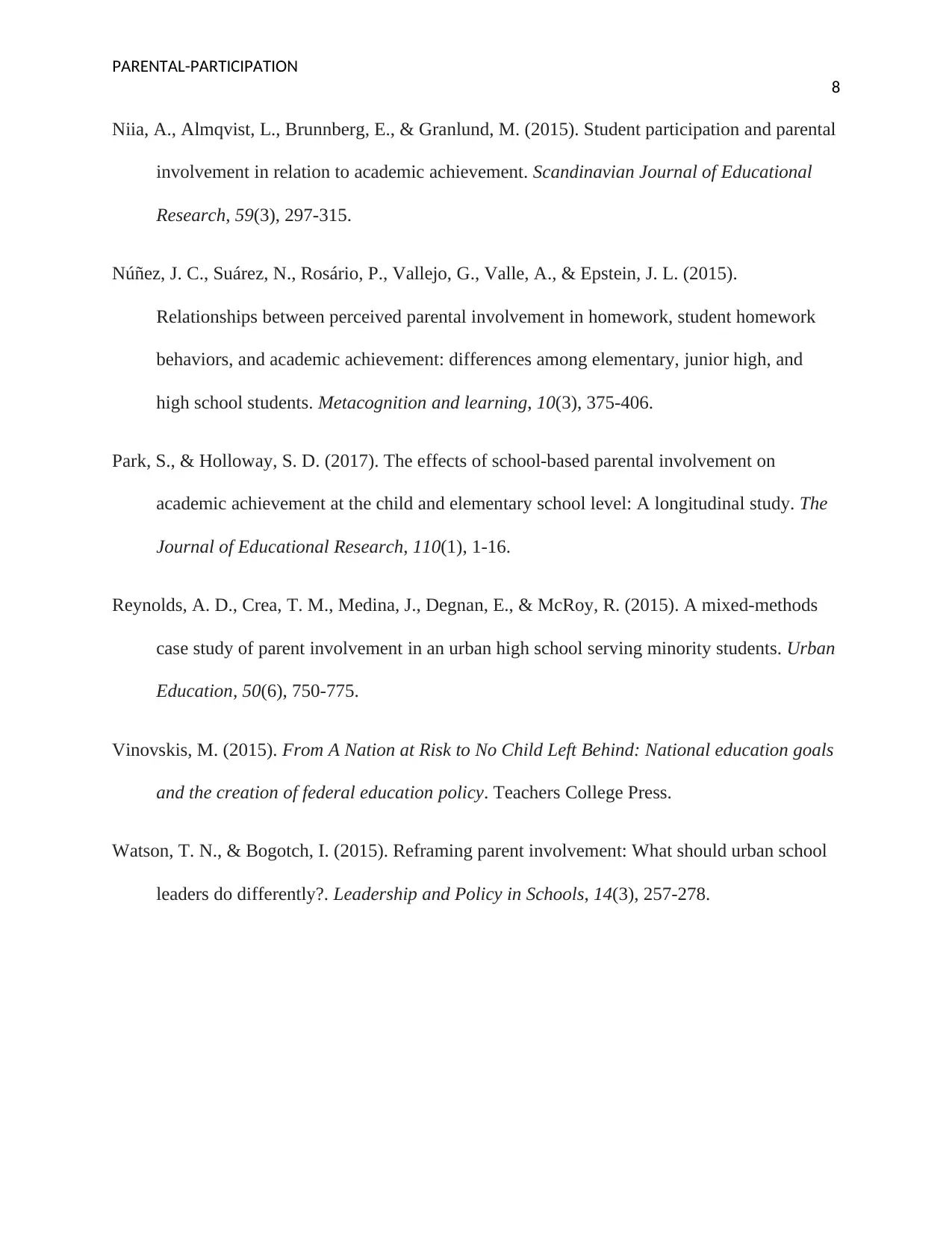
PARENTAL-PARTICIPATION
8
Niia, A., Almqvist, L., Brunnberg, E., & Granlund, M. (2015). Student participation and parental
involvement in relation to academic achievement. Scandinavian Journal of Educational
Research, 59(3), 297-315.
Núñez, J. C., Suárez, N., Rosário, P., Vallejo, G., Valle, A., & Epstein, J. L. (2015).
Relationships between perceived parental involvement in homework, student homework
behaviors, and academic achievement: differences among elementary, junior high, and
high school students. Metacognition and learning, 10(3), 375-406.
Park, S., & Holloway, S. D. (2017). The effects of school-based parental involvement on
academic achievement at the child and elementary school level: A longitudinal study. The
Journal of Educational Research, 110(1), 1-16.
Reynolds, A. D., Crea, T. M., Medina, J., Degnan, E., & McRoy, R. (2015). A mixed-methods
case study of parent involvement in an urban high school serving minority students. Urban
Education, 50(6), 750-775.
Vinovskis, M. (2015). From A Nation at Risk to No Child Left Behind: National education goals
and the creation of federal education policy. Teachers College Press.
Watson, T. N., & Bogotch, I. (2015). Reframing parent involvement: What should urban school
leaders do differently?. Leadership and Policy in Schools, 14(3), 257-278.
8
Niia, A., Almqvist, L., Brunnberg, E., & Granlund, M. (2015). Student participation and parental
involvement in relation to academic achievement. Scandinavian Journal of Educational
Research, 59(3), 297-315.
Núñez, J. C., Suárez, N., Rosário, P., Vallejo, G., Valle, A., & Epstein, J. L. (2015).
Relationships between perceived parental involvement in homework, student homework
behaviors, and academic achievement: differences among elementary, junior high, and
high school students. Metacognition and learning, 10(3), 375-406.
Park, S., & Holloway, S. D. (2017). The effects of school-based parental involvement on
academic achievement at the child and elementary school level: A longitudinal study. The
Journal of Educational Research, 110(1), 1-16.
Reynolds, A. D., Crea, T. M., Medina, J., Degnan, E., & McRoy, R. (2015). A mixed-methods
case study of parent involvement in an urban high school serving minority students. Urban
Education, 50(6), 750-775.
Vinovskis, M. (2015). From A Nation at Risk to No Child Left Behind: National education goals
and the creation of federal education policy. Teachers College Press.
Watson, T. N., & Bogotch, I. (2015). Reframing parent involvement: What should urban school
leaders do differently?. Leadership and Policy in Schools, 14(3), 257-278.
1 out of 9
Related Documents
Your All-in-One AI-Powered Toolkit for Academic Success.
+13062052269
info@desklib.com
Available 24*7 on WhatsApp / Email
![[object Object]](/_next/static/media/star-bottom.7253800d.svg)
Unlock your academic potential
© 2024 | Zucol Services PVT LTD | All rights reserved.





